By Noah Fromson – University of Michigan Health
Image caption: Human neural stem cell transplants (green) survive and migrate throughout the mouse brain (blue) when given a novel monoclonal antibody treatment. Michigan Medicine
Using antibodies instead of traditional drugs, stem cells last significantly longer when used in pre-clinical animal models.
A new approach to stem cell therapy that uses antibodies instead of traditional immunosuppressant drugs robustly preserves cells in mouse brains and has potential to fast-track trials in humans, a Michigan Medicine study suggests.
For this study, researchers used monoclonal antibodies to suppress the immune system in mice and compared the results to traditional immunosuppression with the medications tacrolimus and mycophenolate mofetil. They tracked implanted human neural stem cell survival using luciferase, the protein that makes fireflies glow.




